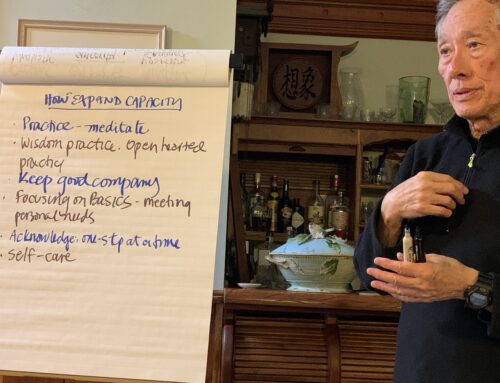“I did then what I knew how to do. Now that I know better, I do better.”
—Maya Angelou

Image by Andy Witchger
Mindfulness practice is in many ways about waking up. We all know how hard it can be to wake up from one night’s sleep, and in mindfulness practice we are waking up from a lifelong dream state.
There is so much to awaken from: delusions of grandeur and smallness; illusions of our perceptions and self-deceptions; intrusions of concepts and ideas; diffusions of effort and attention. In one way or another, we’re all asleep at the wheel, and this practice helps us develop an awareness that this is so.
Meanwhile, on the socio-political fringe lies a concept known as wokeness. This is another form of awareness: a hypersensitivity to social justice issues.
While the domains of mindfulness and social justice are not the same, it could be argued that it’s impossible to ‘awaken’ without in some way being ‘woke’. Through mindfulness, we become aware that our suffering is connected to the suffering of all, so to free ourselves from suffering we must help others do the same. Social justice is also about the alleviation of others’ suffering.
So what does it mean to be woke? According to the Oxford English Dictionary, it is being “alert to racial or social discrimination and injustice’.” But most ‘woke’ people will tell you it means a whole lot more than that: it means acting on what you’re alert to. They will also tell you that most of us don’t see or recognize much of the racial or social discrimination and injustice around us.
It’s these last two factors—inaction and unawareness—that suggest most people who claim to be ‘woke’ are perhaps not quite as woke as they think they are.
And on the flipside, it can be argued that wokeness—like most movements—can go too far. It’s the way of things: people get onto a good thing and then develop a singular lens, focusing only on the movement and losing all context outside of it. Think of the People’s Front of Judea, for instance…
It’s almost as if it’s necessary for a movement to be taken too far, to help determine where the place of balance—the middle path—lies. So, just as it’s common for people to be not be as woke as they think they are, it’s also possible to be ‘too’ woke—to be pointing your finger a little too much for your movement’s own good.
At InStill, we do not claim to be woke. We have too much to learn. Too many unconscious biases to realize; too many blocks to break through; too little action to hang our hats on. But we do claim to be waking up as we continue to develop our awareness around these issues.
Our goal all along has been to reach people who wouldn’t have otherwise had access to the practice, and who therefore may have occupied dream states of ignorance and suffering like the ones we have recognized in ourselves. We want to help people awaken to a clearer reality, and the best way we know to do that is to begin with ourselves.
So we are awakening in a new way today, and aim to be awakening in more ways tomorrow. Today, it is evident that we need to awaken more to racial injustice and the ways we address it. Tomorrow, who knows? We’ll see when we get there, most likely recognizing it through the experience of discomfort that so often precedes meaningful change; watching ourselves react, and allowing our reactions to transform into purposeful responses.
And in so doing, it is our hope that we will do better because we will know better.




Excellent Post Jamie !
Loved the Monty Python clip, which was extremely appropriate :)
Thank you! So true